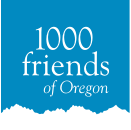2020 may be a short session for the Oregon Legislature — just 35 days long — but it's packed with legislation that we're supporting, opposing or watching. Climate, wildfires, housing and urban growth boundary expansions are just a few of the topics on the docket.

SB 1530 is the climate bill crafted to address concerns expressed by some rural Oregonians about the cap and invest climate bill of last session. Among other changes, SB 1530 applies “caps” only on emissions related to motor vehicle fuel delivered to the Portland Metro area in 2022, and then to larger cities in 2025. No caps on emissions from motor fuel delivered into other, rural areas of Oregon are proposed. 1000 Friends supports key elements of how funds are spent to reduce carbon:
- 25% will be spent to benefit natural and working lands
- 25% will be distributed to the State Forestry Department for wildfire mitigation efforts
- 10% shall be used to benefit Indian tribes
SB 1536 includes many recommendations of the Governor’s Council on Wildfire Response, including using land use tools to address wildfire hazards. The bill addresses numerous issues relating to wildfire hazard planning, protection, fuel treatments and response. We support developing a statewide wildfire hazard map and using Statewide Planning Goal 7 (Natural Hazards) to set minimum local standards for wildfire planning. We support the adoption and implementation of updated building codes and minimum development standards, including limiting development in high-hazard areas to prevent loss of life and property due to wildfire hazards.
Oregon's wildfire seasons have become increasingly severe in recent years. 2018 set records with its fires that covered huge swathes of land that burned for extended periods. Just the cost of fighting wildfires in 2018 was $514.6 million, not including the other economic losses that natural disasters create.
Funding for Oregon Agricultural Heritage Program: In 2017, the legislature established the Oregon Agricultural Heritage Program (OAHP), but it has yet to be funded. If funded, OAHP would help keep working lands in production, provide resources for succession planning, and leverage significant federal matching funds through the federal Farm Bill. We support legislation that will advance through the Joint Committee on Ways and Means to fund OAHP to the tune of $5 million.
For a multitude of reasons, Oregon lost an average of 85,000 acres of farmland each year from 1997 to 2017 — a worrying trend that programs like the OAHP can help curtail.

HB 4095 Allows any city to expand its urban growth boundary (UGB) up to 50 acres — without following land use laws — if 30% “of the development" is affordable housing. Therefore, expansion can occur on most farm and forest lands and natural resource areas without any demonstration of need. The bill could result in a small number of affordable units in exchange for waiving land use laws on a large amount of resource lands for private development. Most significantly, the bill is contrary to the agreement made when HB 4079 passed in 2016. That bill established a pilot project for two cities to undertake something similar, which will lead to an evaluation of the pilot program.
Many communities have land to build more housing within their current UGB — especially after the passage of HB 2001 in the last session. Instead of creating more sprawl via outward development, communities have the opportunity to build more housing options through middle housing and upzoning.
HB 4096 authorizes grants to child care facilities, creates tax credits that support the provision of child care facilities, and would prohibit local governments from conditioning the establishment, development, maintenance, or use of property for child care facilities with conditions that are "more restrictive than conditions imposed on other lawful uses in the zone." Of concern is that the bill would add child care facilities as a conditional use in the farm zone, and require governments to allow the use of a lawfully established dwelling for child care. We take no position on the grant and tax program but oppose the land use provisions applicable to rural farm and forest lands.
SB 1555 would allow dwellings outright for religious officials on farmland, without any analysis of impacts to adjacent farming operations. We oppose this bill because it would allow another nonfarm use on farmland and result in unequal treatment of persons. Currently, applications for dwellings on farmland are not evaluated based on whether the applicant is affiliated with a religion. SB 1555 would require local governments to treat religious officials differently than other landowners when issuing permits for dwellings on farmland.

We are also watching these bills related to wildfire and/or land use:
- SB 1514 (Fuel treatment demonstration projects)
- SB 1515 (Wildfire workforce)
- SB 1516 (Modernization of State Forestry Department)
- HB 4012 and 4050 (Broadly relating to addressing “the use of land.”)
